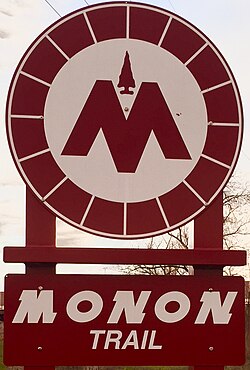Monon Trail
| Monon Trail | |
|---|---|

The Monon Trail utilizes the same logo and design cues throughout the entire trail.
|
|
| Established | 1996-present (in segments) |
| Length | 4.4 mi (7.1 km) (Northwest Indiana) 18.1 mi (29.1 km) (Indianapolis) |
| Location | Lake, Hamilton, Marion counties, Indiana |
| Designation |
U.S. Bicycle Route 35 |
| Trailheads |
Munster—Hammond Indianapolis—Westfield |
| Use | Shared use path |
| Hiking details | |
| Season | Year-round |
| Surface |
Asphalt Compacted stone (north of 161st St. in Westfield) |
| Right of way | Monon Railroad |
| Website |
Northwest Indiana segment Indianapolis segment |
The Monon Trail (known as the Monon Greenway in Carmel) is a rail trail located entirely within the state of Indiana. The Monon Railroad was a popular railroad line connecting the cities of Chicago and Indianapolis, with stops at major settlements along its route. After the decline of railroad travel and the sale of the company in 1987, the portion of the line between Indianapolis and Delphi, Indiana was abandoned.
In Northwest Indiana, the trail is only 4.4 miles (7.1 km) long, running through Lake County from Munster to Hammond. In the Indianapolis area, the trail consists of 18.1 miles (29.1 km) running through Hamilton and Marion counties, connecting Indianapolis, Carmel and Westfield.
The first portions of the trail were created in the late 1990s, but it has been consistently extended in both of its segments since then. Today, the trail is a shared use path complete with trailheads, park amenities and local attractions near it.
Northwest Indiana's portion of the Monon covers 4.4 miles (7.1 km), starting at the Pennsy Greenway near the Illinois-Indiana border in Munster, and running north to the Erie Lackawanna Trailhead in downtown Hammond.
In 2014, the trail was significantly extended, with a segment opening between Munster and Hammond. The segment connected a previously existing portion of the Monon Trail located entirely within Munster. The extension required the reconstruction of the old 1909 railroad bridge across the Little Calumet River, at a cost of approximately $1.5 million.
...
Wikipedia
